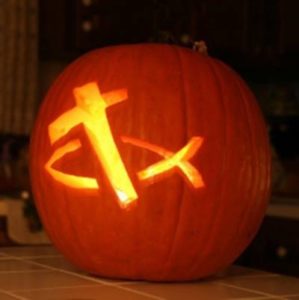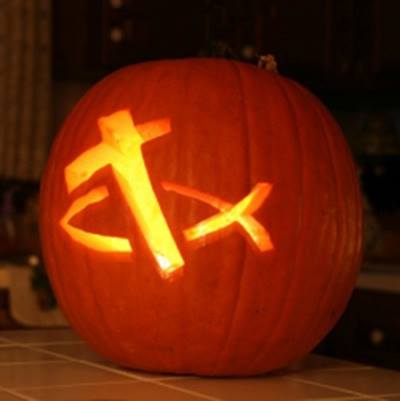Redeem Your Halloween
This article is inspired by an article in Answers in Genesis on Halloween, which says some things I judge to be false, but also says some things that are true and are worth repeating. Since the Bible offers a guideline about how to react to pretty much everything in life in I Thessalonians 5:21: “Test all things, hold fast that which is good,” I’m going to apply that to the Answers in Genesis article by mentioning some things I believe it gets wrong, while celebrating “that which is good.” Which is an attitude that could actually guide the entire celebration-or-non-celebration of Halloween, now that we’re on that subject.
Note the translation of I Thessalonians 5:21 I wrote above is a modernized take off the King James Version, though I did consult several different Greek texts before doing so–note also that many modern translations tie verse 21 to verse 20, which talks about prophecies. So in the NIV, for example, verse 21 would not seem to be a general guideline, but might only be talking about prophecy. But since “prophecy” can be understood as “authoritative statements made by church leaders” I think the practical meaning is about the same even if verses 20 and 21 aren’t separate statements. (Seeing the verses as separate is justified by an immediate context of a number of short statements that aren’t directly connected to each other in I Thes 5 and also be the phrasing in the Greek behind the KJV. But not all Greek texts are exactly alike, so the NIV reading has justification, too.)
I think the connection between “prophecy” and “authoritative statement” would be true even if you believe that prophecies were a spiritual gift limited to the First Century, because if it was legitimate to test claims that authoritative messages were given by the Holy Spirit in the First Century, wouldn’t it also make sense to suggest that we should likewise “test” or “analyze” things Christian leaders say that are derived from the Bible? Which is a message Christians hold to have been given by inspiration of the Holy Spirit? And since Christian leaders discuss pretty much all aspects of life at various times, I believe the phrase “test all things” in reference to authoritative statements would in practice refer to everything, making the “test all things” part a valid general principle, whether you link verse 21 back to verse 20 or not.
So, since we are to test or analyze or examine or think through (the KJV said “prove” which I like, but it sounds funny to modern ears) all things and retain or keep or make use of the parts that are good, let’s look at that Answers in Genesis article on Halloween. It gives a fair history of Halloween as a Celtic celebration related to remembering the dead and gives a correct derivation of the word “Halloween”:
In fact, the current name of “Halloween” originates from the day before All Saint’s Day, which was called “All Hallow Evening”; this name was shortened to “All Hallow’s Eve” or “All Hallow’s Even.” The name changed over time and became “Hallowe’en.”
The article correctly points out that many cultures have celebrations of the dead, listing seven of them. Then the article asks the question why so many cultures have memorials for the dead in the Fall. It offers five possible explanations and draws the conclusion that the most likely explanation is tied back to Noah’s Flood. This is based on the idea that many cultures hold to the same sort of celebration at the same time of year because of the relatively recent origin of human culture after the Flood–and then the article supposes that it makes sense that this would have been the time of the year when Noah made his sacrifice to God after the Flood.
So, according to the Answers in Genesis article, Halloween would be a day of the dead in memory of the sacrifice Noah made after the Flood, transmitted down through time via many cultures. One among many days remembering the dead all happening around the same time of year in a form of cultural memory of the past, specifically the Flood.
OK, so that’s an idea–let’s examine it to see if it’s a “good” or valid one.
For this concept to be valid, it would require, as the article itself said, cultural celebrations remembering the dead to happen in the Fall, right? But the immediate problem is that they don’t. Famadihana (“the turning of the bones”) in Madagascar happens in March. Qingming, one of several Chinese festivals for the dead, takes place in April. Lemuria, the ancient Roman festival of the dead, took place in May. The Japanese Bon festival happens in August (late Summer, not Fall). The Gaijatra festival in Nepal is late August, early September. And there are a number of celebrations in early Fall, like Pitru Paksha in India or Chuseok in Korea and the Chinese Ghost Festival. There are also some late Fall celebrations like Halloween and El Día de Los Muertos in Mexico.
While it’s true my casual Google searching didn’t come up with any celebrations of the dead in the middle of Northern hemisphere Winter (I found no December, January, or February celebrations), one of the key ideas behind the Answers in Genesis article is clearly false. There isn’t any clear unity among world cultures as to when to celebrate a day remembering the dead. This very much weakens the case that all these festivals “must” have had an origin in a common event.
It probably makes more sense to generally tie these celebrations to the cycle of agriculture in the various nations where they are celebrated. So some celebrated death rather ironically with the first growth of new plants (as though remembering the dead alive again) and others celebrated death when the harvest of dried, dead crops come in. Some of these celebrated the early harvest and some later harvesting. At least, that reasoning makes more sense to me than the origin of these common celebrations of the dead offered in Answers in Genesis.
But after pointing out a common origin for days celebrating the dead not justified by a simple examination of a calendar, Answers in Genesis then mentioned some of the Pagan associations with Halloween over time. The article says something I agree with:
Psalm 24:1 points out that everything belongs to the Lord. Therefore, there is no reason to let Satan have Halloween. Despite the Halloween origin, it is not his day in the first place!
When Satan tried to tempt Jesus, he offered Jesus something that was not his to offer (Matthew 4:8—all the kingdoms of the world). Jesus obviously didn’t succumb because it wasn’t Satan’s to give, nor did Satan exercise any authority over Him. Many today believe that Halloween is Satan’s day and recommend staying away from it. But recognizing such a thing would be to disregard that Satan owns nothing and that all days belong to God. Christians can take this day and make better use of it…
I could quibble with the article and say what while Satan isn’t the proper owner of anything, he is a squatter who claims rights over many things and in fact has real influence in the world and (temporary) control over it (see Eph. 2:1-3 for one of many Scriptures that state this). But the article is correct in seeing God as the ultimate owner of everything. And its also correct in saying that we Christians can make claim to elements of the world around us. Modern Pagans celebrate Halloween–that’s a fact. Criminal activity increases on Halloween–that’s also a fact. The adult version of Halloween tends to focus on sexy costumes, getting drunk, and general licentiousness–also a factual statement about a general trend.
But we followers of Christ don’t have to allow it to be celebrated that way in our lives. We can make it something different, at the very least for ourselves. We can “hold fast to what is good.”
Which isn’t me saying you must celebrate Halloween–you certainly don’t have to. But if you do, do it for the Lord and find a way to claim the holiday in the name of God, whether subtly or overtly. (Yes, being overt is okay at times, all you “I’m too cool to be overt” people.)

Some readers would find it corny to put this on a pumpkin–note I’m not saying you have to do something like this–it’s just an idea. Keep or discard at your judgment. Image copyright: beliefnet.com
So if you celebrate your Halloween, celebrate it to the Lord–as in fact a Christian should bring all things back to Him, even if subtly, testing all things and holding fast to what is good. And if you don’t celebrate it, don’t be dour and off-putting. You are not celebrating in devotion to and worship of the Lord, Creator of heaven and earth, someone worth celebrating! (even if you abstain from this particular event).
Let me end with Romans 5:5-6a, 8 (NKJV): “One person esteems one day above another; another esteems every day alike. Let each be fully convinced in his own mind. He who observes the day, observes it to the Lord; and he who does not observe the day, to the Lord he does not observe it…For if we live, we live to the Lord; and if we die, we die to the Lord. Therefore, whether we live or die, we are the Lord’s.”










































I went to a Obon (Bon) festival this year. St Paul is a sister city to Nagasaki, and Como park has a legit Japanese garden. I wasn’t even the only white hipster weeb in a kimono. They had the little lantern boats on the ponds and a dozen Asian food trucks.
I don’t have the energy for Halloween this year. My decor is just leaving the wads of black cat hair where they lie.
Sounds like an interesting holiday! I know very little about it. My world travels have taken me to Europe, Latin America, Africa, the Middle East, and Central Asia. But I’ve never been to the Far East and don’t know as much about the cultures there as I’d like.
My family practically never celebrated Halloween, but we did go to Christian fall festivals that local schools held. And we did decorate for fall, though not Halloween, which suited me just fine. Fall’s my favorite season, which is why my pen name is Autumn, but I never really liked being afraid and thus had no problem with my parents avoiding the celebration of scary things.
I agree that many cultures were probably making celebrations of the dead in coordination with agricultural cycles, but it is worth noting that holiday celebrations can shift around until they take place at a different time than the original events they commemorate. Like, we choose to celebrate Christ’s birth on Christmas when he probably wasn’t born then.
An interesting thing would be to see how holidays might change as cultures moved to other places with different weather patterns. Like if they were used to living in a place with four seasons, but then moved to another place that only had a rainy season and a dry season or something.
Your comment on holidays changing seems especially appropriate when talking about alien worlds with different length years…it would be literally impossible to have holidays in the same season all the time with the same length of time as on Earth.
Yeah. Seeing how beings would adapt and change their traditions after moving to a new planet would be an interesting culture exploration/study.